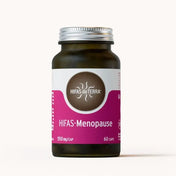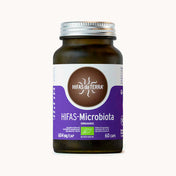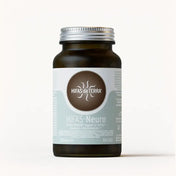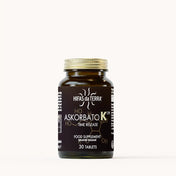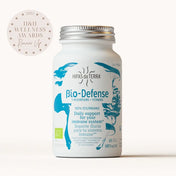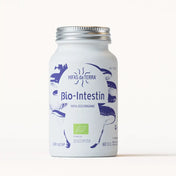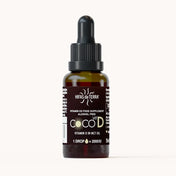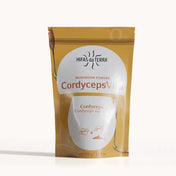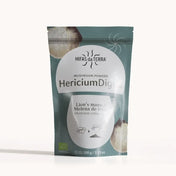Table of Contents
In this blog, we explore hormones' intricate dance and profound influence on well-being, from subtle energy shifts to pronounced mood swings and physical health changes. We unravel the complexities of hormonal balance, shedding light on the role medicinal mushrooms play in supporting female hormonal health. These natural remedies offer holistic support, acting as adaptogens to regulate menstrual cycles, promote overall hormonal harmony, and even alleviate pain. Join us as we uncover the potential benefits of medicinal mushrooms in restoring balance to the female endocrine system.

What is female hormone imbalance?
Female hormone imbalance refers to irregular levels of hormones like oestrogen, progesterone, and testosterone in the female reproductive system. It can cause symptoms like irregular periods, mood swings, weight changes, fatigue, and more. Balancing hormones is important for overall health and may involve lifestyle changes, dietary adjustments, and medical interventions
What can help with female hormone imbalance?
Regulating female hormone imbalance involves various approaches tailored to individual needs. Here are some strategies:
- Healthy Diet: Consuming a balanced diet rich in fruits, vegetables, whole grains, lean proteins, and healthy fats can support hormonal balance. Avoiding processed foods, sugar, and excessive caffeine can also help.
- Regular Exercise: Engaging in regular physical activity, such as aerobic exercise, strength training, and yoga, can help regulate hormones and reduce stress levels.
- Stress Management: Practicing stress-reduction techniques like meditation, deep breathing exercises, mindfulness, and adequate sleep can help lower cortisol levels and support hormonal balance.
- Natural Supplements: Certain herbs and supplements, such as evening primrose oil, and medicinal mushrooms, may help support hormonal balance. However, it's essential to consult with a healthcare professional before starting any new supplement regimen.
- Limiting Exposure to Hormone Disruptors: Minimising exposure to environmental toxins and hormone-disrupting chemicals found in plastics, pesticides, and household products can help maintain hormonal balance.
- Regular Medical Check-ups: Regular visits to a GP or holistic practitioner can help monitor hormone levels and identify any imbalances early on. They can guide you on appropriate treatment options if necessary.

How can Reishi help with hormone imbalances?
Reishi, a revered medicinal mushroom has drawn our attention in recent studies for its remarkable ability to alleviate stress and regulate hormone levels. This natural remedy offers a holistic approach to wellness, providing hope for those seeking relief from the demands of contemporary life.
Research has explored the bioactive components of Reishi, uncovering various compounds believed to contribute to its effects. Among these are polypeptides and triterpenes, which are thought to have roles in neurotransmitter and endorphin synthesis, potentially influencing our stress response.
Some studies suggest that its activity as a 5-HT2A receptor antagonist may be associated with its effects on mood and anxiety. By affecting neurotransmitter pathways, Reishi could offer a natural option for those seeking relief from mood disorders and anxiety.
Moreover, Reishi's alleged anti-stress and emotional balancing effects, and its ability to modulate neuronal activity, may promote relaxation and enhance mood. These characteristics position Reishi as a potential aid in achieving emotional balance amidst the challenges of modern life.

Natural supplements for hormone regulation
- Vitamin D: Plays a role in hormone regulation, particularly with insulin and thyroid hormones. Supplementation may be beneficial for those with low sunlight exposure.
- Omega-3 Fatty Acids: Found in fish oil supplements, omega-3 fatty acids can help regulate hormones by reducing inflammation. They are particularly beneficial for mood-regulation hormones like serotonin and dopamine.
- Adaptogens: Ashwagandha, Rhodiola, Reishi and holy basil are adaptogens that can help support the body in managing stress and promoting hormone balance by regulating cortisol levels. Research suggests that Reishi extracts can modulate inflammation and adrenal metabolism, which are pivotal in hormone regulation. Women, in particular, stand to benefit from Reishi's influence on hormone balance and studies have shown its efficacy in regulating hormone levels, thereby offering potential relief for conditions such as osteoporosis and other menopause-related disorders.
- Magnesium: Involved in over 300 biochemical reactions, including hormone regulation. It can help balance cortisol levels and improve sleep quality, essential for hormone balance.
- Vitamin B Complex: B vitamins, including B6, B12, and folate, play roles in hormone synthesis and regulation. A B-complex supplement can support overall hormone balance and energy production.
- Probiotics: Gut health is closely linked to hormone regulation. Taking a probiotic supplement can support a healthy balance of gut bacteria, potentially aiding hormone balance, especially those involved in digestion and metabolism.
Medicinal Mushrooms for Pain
A wealth of scientific studies underscores the efficacy of Reishi triterpenes as formidable anti-inflammatory and analgesic agents (Ko, H. H., et al, 2008). These bioactive compounds penetrate deep into the body, targeting inflammation and providing relief from a spectrum of painful conditions.

Menstrual cramps
For those grappling with the monthly throes of menstrual cramps, Reishi emerges as a soothing balm. Its anti-inflammatory properties help alleviate the discomfort associated with menstrual cycles, offering much-needed relief during challenging times.

Hormone-Related Joint Issues
Menopause often brings along an array of discomfort, including joint pain. Reishi steps in as a natural solution, offering relief from the aches and pains that accompany this transformative phase of life.
One study, conducted by Kuniyoshi Shimizu and published in the Journal of Wood Science, highlighted Reishi's role in regulating female hormone levels and its potential implications for treating hormone-related and painful conditions such as osteoporosis. Similarly, Deepalakshmi K. et al.'s research in 2013 observed Reishi's significant regulatory action on estrogen receptors, further underscoring its relevance in hormone modulation.
The debilitating effects of osteoporosis can be mitigated with the help of Reishi. By combatting inflammation and bolstering bone health, this medicinal mushroom provides a gentle yet effective means of managing osteoporosis-related pain
Summary
In summary, by adopting a holistic approach that combines healthy lifestyle habits, stress management techniques, and medical interventions when needed, it's possible to regulate female hormone imbalance and support overall well-being.
The research cited in this blog highlights the bioactive components found in Reishi, such as polypeptides and triterpenes, which may influence neurotransmitter and endorphin synthesis, thereby impacting our stress response. Moreover, Reishi's potential as a 5-HT2A receptor antagonist suggests benefits for mood and anxiety disorders by modulating neurotransmitter pathways. Its anti-stress properties, along with its ability to balance emotions and regulate neuronal activity, position Reishi as a promising natural solution for achieving emotional equilibrium in the face of modern challenges
- Deepalakshmi, Krishnamoorthy, and Sankaran Mirunalini. “Modulatory effect of Ganoderma lucidum on expression of xenobiotic enzymes, oxidant-antioxidant and hormonal status in 7, 12-dimethylbenz (a) anthracene-induced mammary carcinoma in rats.” Pharmacognosy Magazine 9.34 (2013): 167.
- Ko, Horng-Huey, et al. “Antiinflammatory triterpenoids and steroids from Ganoderma lucidum and G. tsugae.” Phytochemistry 69.1 (2008): 234-239.


